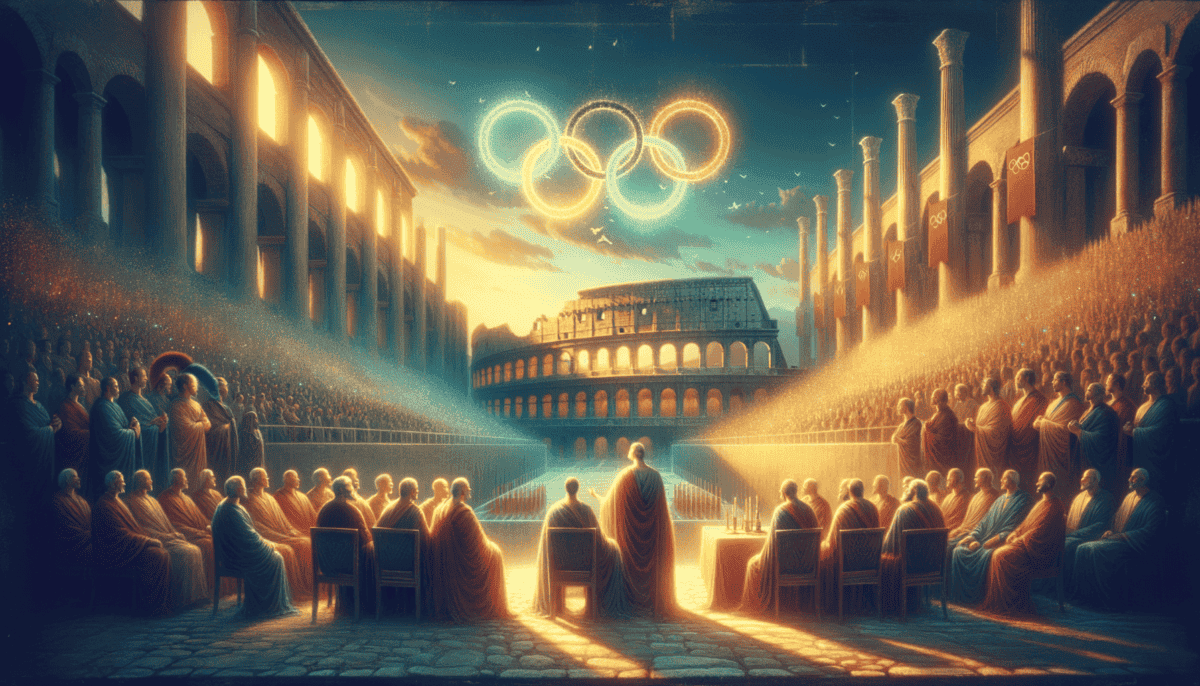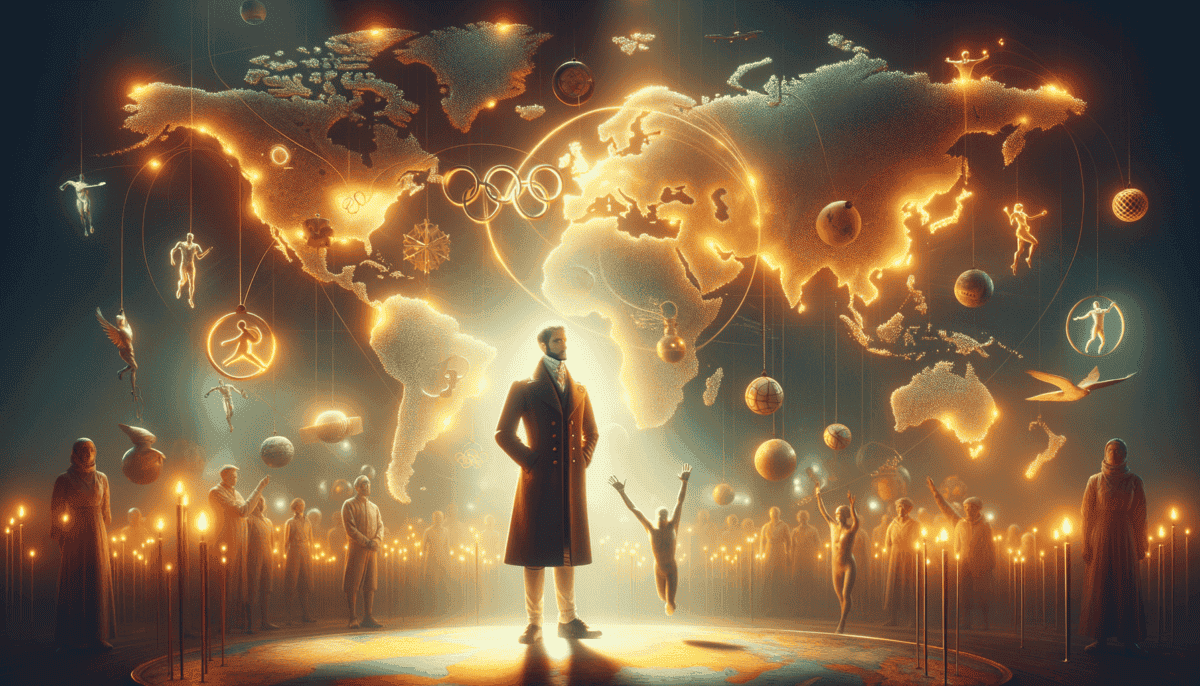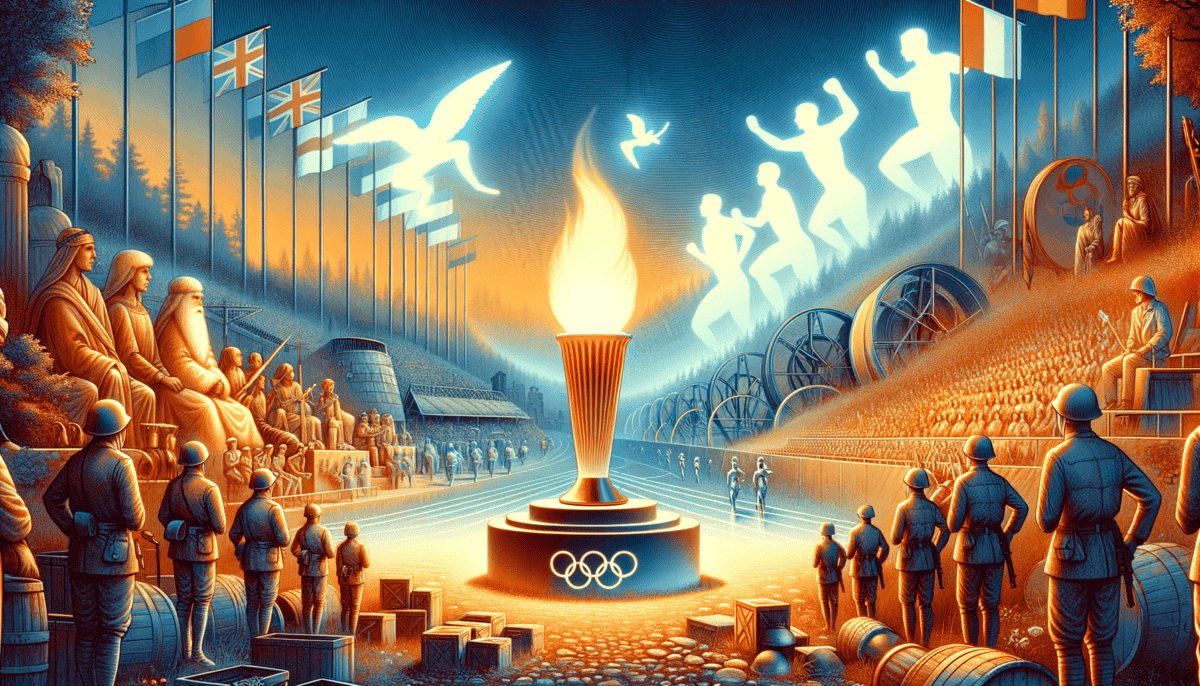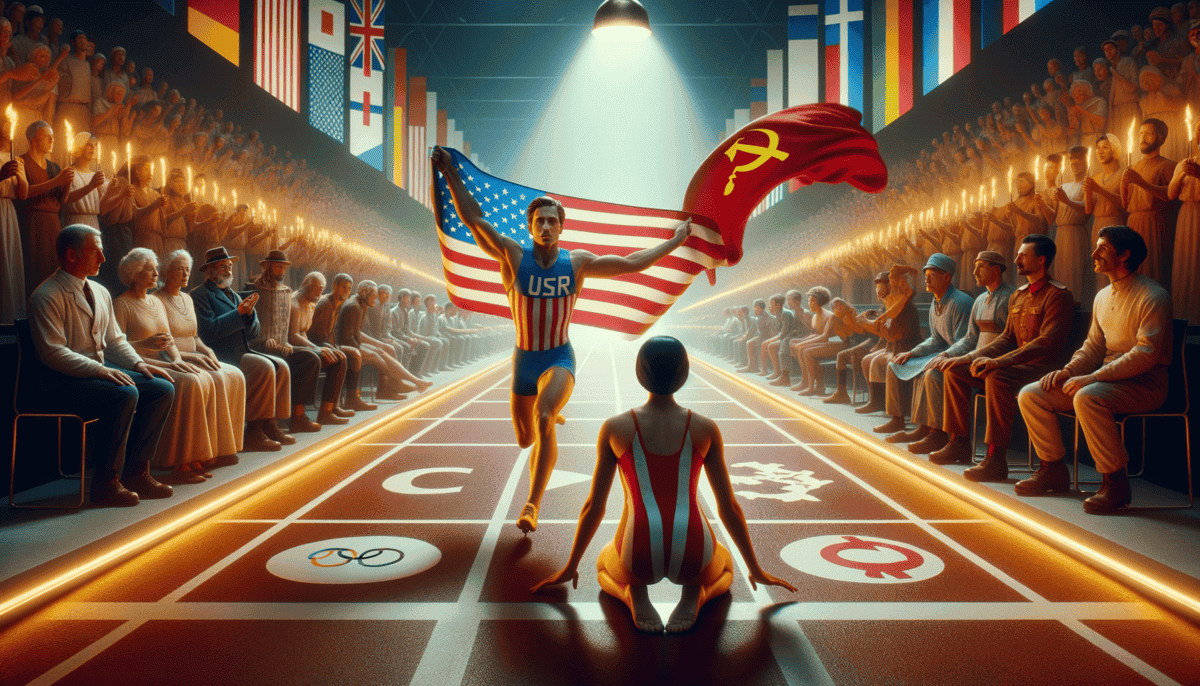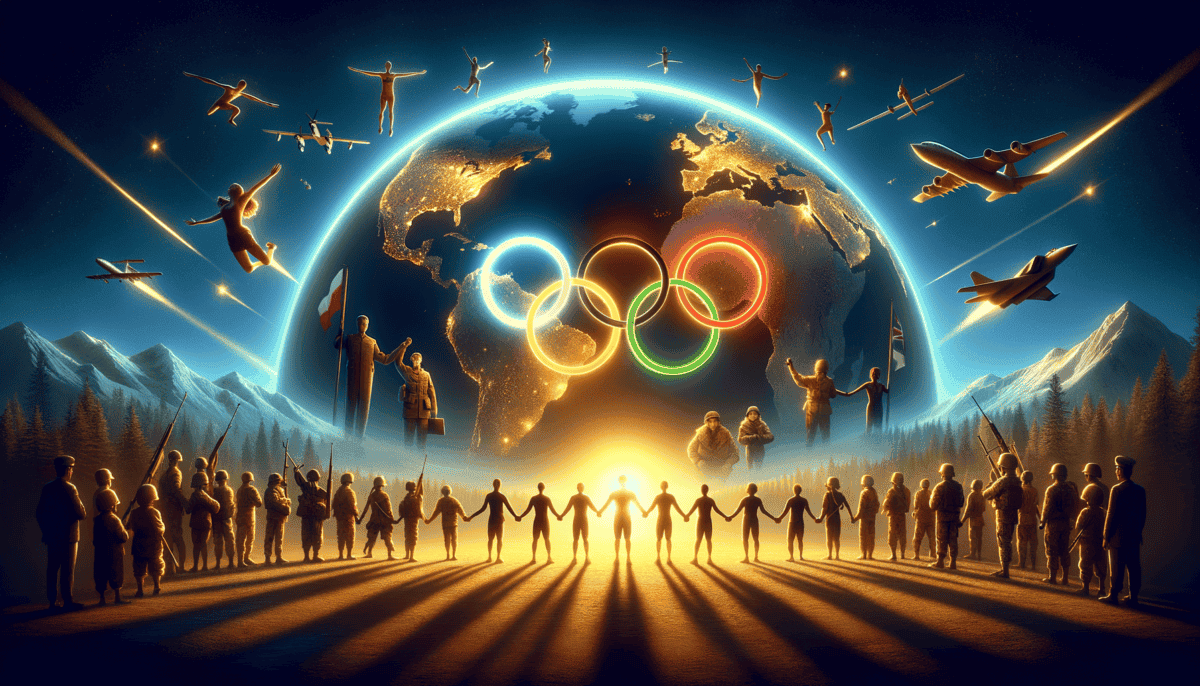A Time of Peace and Play
Long ago in Greece, people lived in different cities. These cities often fought with each other. But something special happened that changed everything!
The year was 776 BC. The sun shone bright over a place called Olympia. People from all the cities came together here. They weren't coming to fight – they were coming to play!
"Why do we always have to fight?" asked a young Greek boy named Theo to his father.
His father smiled and pointed to the athletes gathering in the field. "Watch," he said. "Today, we solve our problems differently."
The athletes came from different cities. Some were from Athens, others from Sparta. Usually, these cities were enemies. But in Olympia, everything changed. Instead of using swords, they used their strength to run races. Rather than throwing spears at each other, they threw them at targets.
The Special Rules
The Greeks had important rules for the games:
- Everyone had to stop fighting during the Olympics
- Athletes had to be kind to each other
- Winners got olive wreaths as prizes
- The games honored Zeus, their most important god
"Look!" Theo shouted excitedly. "They're starting the race!"
Athletes lined up at the starting line. Their muscles were strong from training. Some had been soldiers, but today they were runners. The crowd went quiet. Then… they were off! ♂️
“The Olympics showed us a better way to prove who was best. We didn’t need wars anymore – we had sports!” – Ancient Greek saying
The games lasted five days. People watched boxing, wrestling, and chariot racing. But the best part wasn't who won or lost. It was that people who were usually enemies became friends.
Every four years, the games happened again. Cities stopped their fights and sent their best athletes. The Olympics became a special time when peace replaced war.
Theo watched the final race of the day. The sun was setting, making the sky orange and pink. Athletes from different cities stood together, sharing stories and laughing.
"Father," Theo said, "I want to be in the Olympics one day."
His father hugged him. "Remember, my son. The Olympics isn't just about winning. It's about bringing people together in peace."
The crowds began heading home as stars appeared in the sky. They would return to their cities with stories of amazing athletes and new friendships. The Olympic spirit of peace had changed them all.
The End of the Games
Many years after the first Olympics, big changes came to Greece. A new group called the Romans took over. They had different ideas about sports and games. ️
“These games are too Greek!” said the Roman leaders. They wanted to make everything more Roman. The Olympics started to change.
Marcus, a young Roman boy, watched as the games became different. “Why are the athletes fighting with real swords now?” he asked his mother.
“The Romans like more exciting shows,” she explained. “They think the old Greek games are too boring.”
Big Changes Come
The Romans made many changes to the Olympics:
- They added dangerous fighting shows
- They let professional athletes compete
- They moved some games away from Olympia
- They made the prizes about money instead of olive wreaths
But the biggest change was still to come. In the year 393 AD, a Roman leader named Theodosius made a very big decision.
“The Olympic Games must stop!” he announced. “They honor old Greek gods, and we are now Christian.”
People were very sad. The Olympics had been happening for over 1,000 years! But Theodosius’s words were law.
“What will happen to Olympia?” Marcus asked, looking at the empty stadium.
His mother sighed. “Everything changes, my son. Maybe someday, someone will bring the games back.”
The beautiful buildings of Olympia began to fall apart. Grass grew over the running tracks. The place where athletes once competed became quiet.
But something amazing happened. Even though the Olympics stopped, people didn’t forget about them. They told stories about the great athletes and the special time when enemies became friends.
Years passed. Then hundreds of years. Then more than a thousand years! The old stadium stayed quiet, but the Olympic spirit lived on in people’s hearts.
One day, people would remember why the Olympics were so special. They would think about how sports could bring peace instead of war. And when they did, something wonderful would happen – but that’s another part of our story…
A New Beginning
The year was 1889, and a young Frenchman named Pierre de Coubertin had a big dream. He wanted to bring back the Olympic Games!
“Why can’t we have games like the ancient Greeks?” Pierre asked his friends. “Games where people from different countries play together instead of fighting?”
Pierre traveled around the world, telling people about his dream. Some people laughed. Others didn’t think it would work.
“Countries are too different now,” they said. “It won’t be like ancient Greece.”
But Pierre didn’t give up. He knew sports could bring people together.
The Big Meeting
In 1894, Pierre called a special meeting in Paris. People from many countries came to talk about bringing back the Olympics.
“Sports can help us understand each other better than wars,” Pierre told everyone. “Let’s make new Olympic Games for the whole world!”
The people at the meeting loved Pierre’s idea! They made a new group called the International Olympic Committee to help run the games.
The First Modern Olympics
When the games began in Athens, it was like magic! ✨ Athletes from 14 different countries came to play together.
“Look at all the flags!” said Maria, a young Greek girl watching the opening day. “I’ve never seen so many countries together without fighting!”
The first modern Olympics had:
- Running races
- Swimming contests
- Jumping competitions
- Wrestling matches
- Many other fun sports
The games were a big success! People loved watching athletes from different countries compete fairly and become friends.
“This is even better than I dreamed,” Pierre said, watching the athletes shake hands and smile together.
Growing Bigger
After the first games, more countries wanted to join. Some people still worried about old fights between nations. But when athletes played together, they forgot about being enemies.
“See?” Pierre would say. “Sports can help make peace!” ️
The Olympic Games grew bigger and bigger. Every four years, more countries joined. People started to see that Pierre was right – sports really could bring the world together!
But dark clouds were coming. Some countries were getting angry with each other again. The Olympics would soon face its biggest test – could the games survive when the whole world went to war?
Dark Days for the Games
The world changed in 1914. A big war started that would change everything – even the Olympics.
Little Tommy asked his father, “Why aren’t there any Olympics this year?”
“Because of the war, son,” his father replied. “Almost all the athletes had to become soldiers instead.”
Athletes Become Soldiers
Many Olympic champions traded their sports clothes for army uniforms. ➡️ ️
“I used to run races for medals,” said Jack, a runner from England. “Now I’m running through battlefields to help my friends.”
Some athletes used their Olympic skills to help in the war. Swimmers became rescue workers. Runners carried important messages. Strong wrestlers helped move heavy supplies.
The Games Must Wait
After the first big war ended in 1918, people tried to bring back the Olympic spirit. The games started again in 1920 in Belgium.
But then another bigger war came in 1939.
Sarah, a young gymnast, wrote in her diary:
“Dear Diary,
Today we learned there won’t be Olympics until the war is over. My coach says we must keep practicing and keep hope alive. Maybe someday we’ll all play together again.”
Keeping the Spirit Alive
Even during the darkest days, some athletes kept training. They believed the Olympics would come back.
“We can’t let war kill our dreams,” said Maria, an Italian runner. She practiced in her backyard every morning.
In prisoner camps, captured soldiers organized their own small Olympic games. They used whatever they could find:
- Jumping competitions over ropes
- Running races in small yards
- Wrestling matches on grass
- Made-up games with sticks and stones
Hope Returns
Finally, in 1948, the Olympics came back! The games were in London, England.
“Look how many flags are flying again!” cheered little Tommy, now older. “Just like before the war!”
But the world had changed. New worries were coming. Some countries that used to be friends were now angry at each other. They would use the Olympics in a different kind of fight – one without weapons but full of other kinds of battles.
The games had survived the big wars, but could they handle what was coming next? A time when countries would fight with medals instead of guns?
A Different Kind of Battle
The year was 1952. The Olympics were back, but something was different. Two big teams didn’t like each other – America and the Soviet Union. vs
More Than Just Games
“Daddy, why does everyone care so much about who wins?” asked Sally, watching the Olympics on TV.
“Because now winning means showing which way of life is better,” her father explained. “It’s like a peaceful way to compete.”
“Every medal we win is a victory for our way of life,” said Coach Thompson to his American team. “But remember – we play fair and show respect.”
The Battle for Gold
Both sides worked super hard to win.
The Americans were great at:
- Swimming
- Track and field
- Basketball
- Baseball
The Soviets were amazing at:
– Gymnastics
– Wrestling
– Weight lifting
– Ice hockey
Special Moments
Sometimes, the athletes became friends even though their countries didn’t get along.
“Look!” Maria pointed at two gymnasts – one American, one Soviet. “They’re helping each other practice!”
The Biggest Show
Every Olympics became bigger and more exciting. Both sides spent lots of money to train their athletes.
Little Bobby wrote in his school essay:
“The Olympics are like a giant show now. Everyone watches to see who will win. But the best part is when athletes smile and hug after the game, no matter who won.”
Changes in the Games
The Olympics changed a lot during this time. They became:
✨ Bigger than ever before
Shown on TV everywhere
More colorful and exciting
Full of new sports
Learning to Play Together
“Even though we compete hard,” said Coach Ivan from the Soviet team, “we’re showing that we can still play together without fighting.”
Sarah watched the closing ceremony with tears in her eyes. “See how everyone is dancing together? Maybe we’re not so different after all.”
The Cold War Olympics showed that even when countries don’t get along, their people can still play together and respect each other. But would this spirit of friendship last? Could sports really help make peace in the world?
A Legacy of Hope
The sun rose bright over the Olympic stadium. Athletes from all over the world gathered, their faces glowing with excitement.
Breaking Down Walls
“Remember when countries wouldn’t even talk to each other?” Coach Maria asked her young athletes. “Now look – they’re all here, playing together!”
Little Tommy raised his hand. “But how did it happen, Coach?”
“The Olympics showed us something important,” she smiled. “That friendship is stronger than fighting.”
Stories of Courage
Around the track, athletes from countries that once fought wars now ran side by side. ♂️
More Than Just Sports
The Olympics today help in many ways:
- Bringing countries together
- Teaching kids about peace
- Helping people understand each other
- Making the world feel smaller
Special Olympic Moments
“When I see athletes helping each other up after a race, I know there’s hope for our world,” wrote Jenny in her school newspaper.
The Olympic Promise
Every time the Olympics start, athletes make a special promise:
“We will play fair and be friends, no matter where we come from.”
Looking to the Future
Coach David watched his team practice. They came from different countries, spoke different languages, but played as one.
“What’s the best part about the Olympics?” a reporter asked young Amy.
“That it shows us how to be friends with everyone, even if we’re different!”
A Never-Ending Story
As the Olympic flame burns bright, it reminds us that sports can change the world. From ancient battles to modern friendship, the Olympics show us that peace is possible.
Young Carlos watched the closing ceremony with wide eyes. “Will there always be Olympics, Mom?”
“Yes, sweetie,” she smiled. “As long as people believe in peace and friendship, the Games will go on.”
And so, the Olympic story continues. Every four years, the world comes together to play, to share, and to remember that what brings us together is stronger than what pulls us apart. The flame burns on, lighting the way to a more peaceful future for all. ✨


